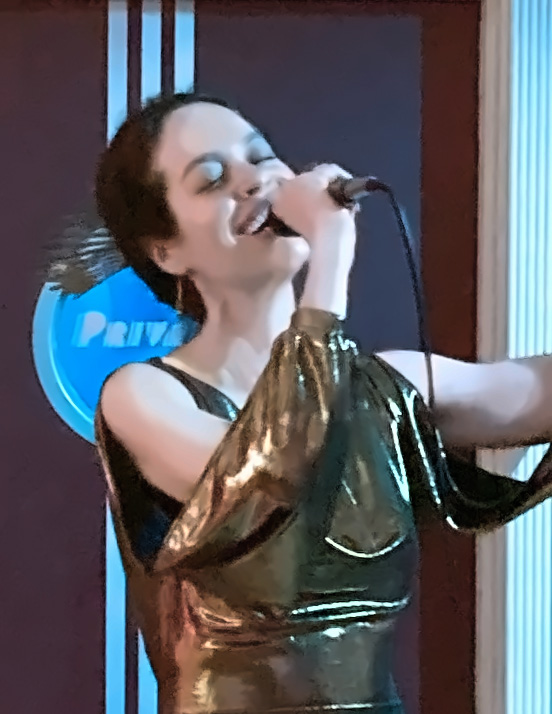A few nights ago, I cautiously donned my KN95 mask and went to a (well ventilated, vaccinated-only) San Francisco bar to see my friend Tara DeMoulin sing a set of jazz standards. I hadn’t had any in-person contact with her since before the pandemic, so having an opportunity to hear her voice was worth the slight chance of catching a potentially fatal case of Omicron.
Apart from being a singer, Tara is an actor, writer, aspiring filmmaker, and autodidact who can express herself eloquently and brilliantly on any topic, including arts, history, and politics. (If she had a blog, I would urge you to abandon mine and go read hers instead; but since she doesn’t, all I can suggest is that you follow her on Facebook.) The first time I met Tara was during a break at a film festival, when we struck up a conversation over refreshments. When she mentioned that she was a vocalist, I naturally asked when I could hear her sing. She responded by cupping her hand and singing a song directly into my ear, which is an experience I would recommend to anybody.
Like any good performer, Tara puts her entire self into everything she sings. It’s a skill that I envy, because for me, singing a song is simply the act of singing a song. I love the physical sensation of singing, and I strive to do it as well as I can, but I’ve never been able to find an emotional connection to the words in the way Tara so clearly does.
That’s probably related to the fact that when I listen to a song, I rarely notice the lyrics; all I really hear is the music. My popular-music-loving wife Debra is the opposite: When she listens to a song, she hears only the words. We’ll occasionally have a conversation in which she’ll refer to a well-known song by its content, such as when she described Rupert Holmes’s “Escape” — the one with the catchy chorus that starts with “If you like piña coladas…” — as a song about a couple who turn to the personal ads as a way to escape their boring relationship, only to discover that the attractive strangers they find there are each other. My reaction in those cases is always one of surprise: “You mean that song is about something?”
A few years ago, Tara told me about a recording that so moved her, she found herself compulsively listening to it over and over. It was “La Corrida,” a song by the French singer Francis Cabrel, expressing the horror of a bullfight from the point of view of the doomed bull. She recited the lyrics for me in perfect French, her voice filled with urgency and pain:
Depuis le temps que je patiente dans cette chambre noire
J’entends qu’on s’amuse et qu’on chante
Au bout du couloir…[1]
I confessed to her that I’d never had the experience of being moved by a song in the way she was. Nearly everyone I know has a song or an album that — particularly during their adolescence — they deeply identified with, that might even have represented a turning point in their life. I’ve always been able to enjoy a song; I can understand its message; I can appreciate its beauty and craftsmanship; but I never had the often-described feeling of a song speaking directly to me, as if the songwriter had been able to see into my soul.
Tara refused to accept this. She pressed me: There must have been some time, she said, when I felt an especially deep connection to something I listened to. I thought for a bit, and then said, “Yes, there was.” It was in college, when I was taking an introductory music course, and I heard a recording of the second movement of Mozart’s Jupiter Symphony. I have a perfect memory of the room I was sitting in — or at least the room my body was sitting in — while the music wrapped itself around me and carried me, awestruck, to a place from which I felt I could embrace the universe. That was the first time I’d ever experienced a symphonic composition as something other than background noise, and it was the source of an attraction to classical music, and particularly to Mozart, that I still hold.
Tara’s reaction was a relieved smile that said, “I told you so.” She was satisfied that I was, after all, a normal human being. In retrospect, though, I’m not as convinced as she was. My Mozart experience was not in response to a song — a verbal message expressed with music — but to pure music. And since that day, I’ve never had a similar response to a recording, even a recording of the Jupiter Symphony. The joy I take in music all comes from live performance, where I’m experiencing not just the music itself, but the immediate energy of the people making it.
Looking back at Tara’s performance a few nights ago, I’m not sure that I could separate my enjoyment of her singing from my affection for her as a person, and my appreciation of her charisma as a performer. (Such is Tara’s sway over a crowd that when she offhandedly recommended a cocktail called The Liberal, pretty much everyone at the bar turned around and ordered one.) I must admit that when she performed her beautiful rendition of “La Vie en Rose,” I wasn’t thinking about the bittersweetness of romance so much as how lovely it would be to have that melody sung directly into my ear.
[1] As I’ve been waiting in this pitch-dark room / I hear merrymaking and singing / At the end of the corridor…

Recent Comments